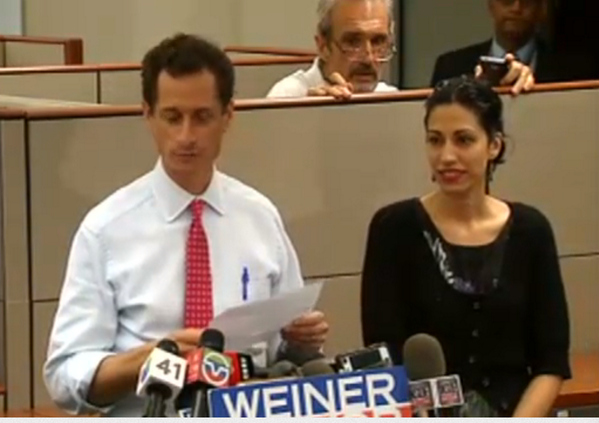Anthony Weiner Sought Professional Help For His Lewd Online Behavior, But Don’t Call Him An Addict

It's a sad, sad week in Anthony Weiner's household. Just when the New York City mayoral candidate and his wife Huma Abedin thought they were mere steps away from packing up and moving their family into Gracie Mansion, news of his continued lewd online behavior surfaced and support for the disgraced politician plummeted.
What makes Weiner's indiscretions particularly newsworthy is that he is a repeat offender, a man who resigned from Congress in 2011 to "seek professional treatment to focus on becoming a better husband and healthier person." While he touts that he spent three days in a treatment center in Houston after initially being caught sending lewd messages and photographs to women outside of his marriage that year, Weiner refuses to call himself a sex addict. But should he?
Since he announced that he was joining the mayoral race in May, New Yorkers had been surprisingly forgiving of Weiner's past — not just his inappropriate communications with women using his official Twitter account in 2011, but also his lies and attempts to cover it up following the illicit communications were exposed. Finding out that he was still engaging in that type of behavior under the name "Carlos Danger" a year later in 2012 has left many skeptical of Weiner's ability to lead New York City with integrity.
"For many Democrats, the latest revelations about Anthony Weiner are more of the same, only more so," said Dr. Lee M. Miringoff, director of The Marist College Institute for Public Opinion. "Weiner has lost his lead and his negatives are at all time high."
According to Fox News, a poll released Thursday shows that 55 percent of New York Democrats have an unfavorable perception of Weiner. That is a huge change considering that Weiner was the leading the Democratic race for mayor by five percent just last month.
Dr. Cory Schortzman, a recovering sex addict himself, told The Daily Beast that Weiner is just a sex addict in denial. A person is considered "addicted" to a substance or behavior, Schortzman explained, when that substance or behavior gets in the way of one of five key things: relationships, career, legal status, health, or money. In Weiner's case, the fact that he stopped, got treatment, and continued to engage in sexual behavior online knowing that it could jeopardize the future of his career and relationship is surely in line with Schortzman's definition.
"What is addiction? Basically an addiction is 'I can't stop, I tried to stop, I need more of that substance to get the original high and I need to go it more often,'" Schortzman said.
So maybe instead of focusing his attention on his mayoral candidacy, Weiner should take more substantial steps to address his (possible) sexual addiction. In that same article, Dr. Douglass Weiss, a licensed psychologist who called Weiner "the poster-boy for sex addiction therapy," explained that three days in a clinic is usually not enough treatment for sex addiction.
"He seems like a person who wants to help, who wants to serve, but his addiction is robbing him of his dreams," said Weiss. "So I would hope he gets better help this time."
Published by Medicaldaily.com



























